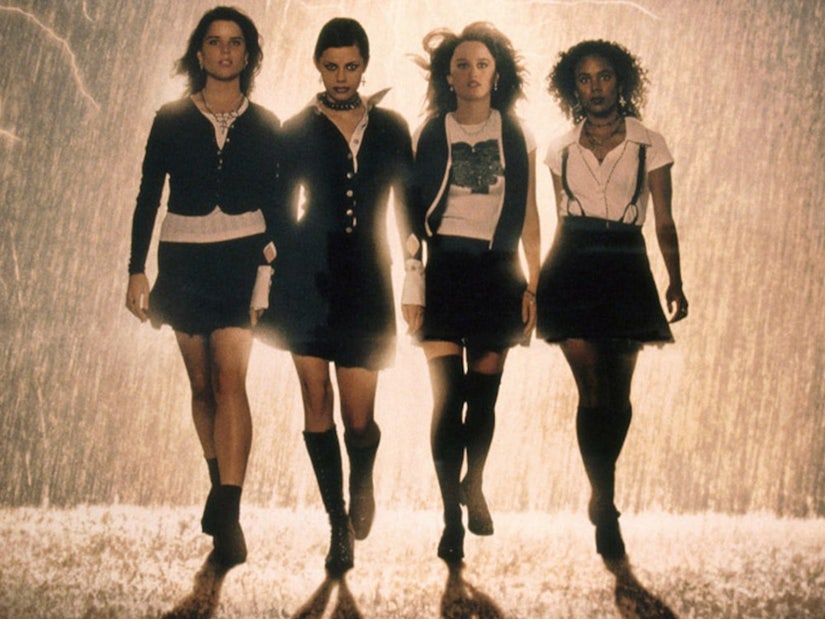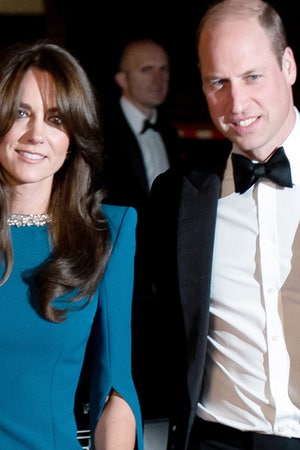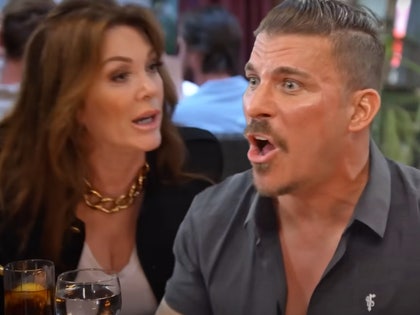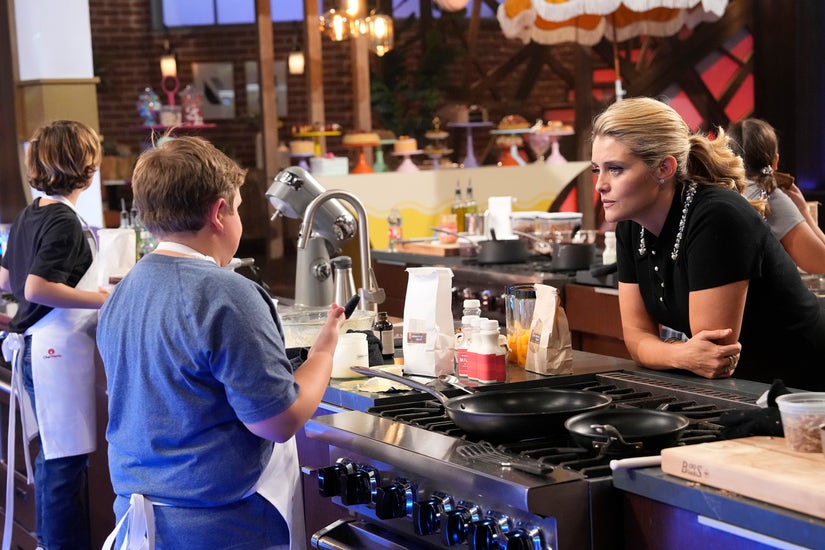 Hulu
Hulu
Serena reaches out to Rita after her shocking pregnancy reveal, June and Janine are all each other has left now as they face a callous new world order.
After an explosive final few moments at the end of three back-to-back-to-back episodes of "The Handmaid's Tale," the action slowed down considerably in the fourth installment, shifting back and forth from June and Janine on the run in what's left of the United States, and Rita, trying to find her own way in Canada.
There's an interesting juxtaposition between what's almost being presented as a (slightly flawed) paradise north of the border and the ongoing nastiness just south. This week, Rita found herself coming face to face with her former owners, so to speak, in the Waterfords.
 Getty
Getty
Mckenna Grace Wants People 'Uncomfortable' with Her 14-Year-Old Wife on Handmaid's Tale
View StoryAs she was slowly climbing out of that subservient mindset that had been drilled into her during her time as their Martha in Gilead, June and Janine were learning that some of the horrors subjected upon women have always been there, and will always be there, no matter who's in charge and what excuse they're using to justify their behavior.
Even the flashback, a much-needed exploration into Janine's life before the fall of America, showed just how awfully women are treated. In this particular case, "Handmaid's" tackled how women are preyed upon by anti-abortion activists.
Other than the lower fertility rate, the flashbacks were a direct statement on our world and how women's rights are treated, even by other women. In this case, the woman Janine encountered at the crisis pregnancy center she went to, thinking it was an abortion clinic -- because that's what they want you to think -- lied to her.
"All women regret doing this," she lied to the emotionally fragile Janine. "No one is fine after killing their baby." This was cruelty at work, seeking control and emotional manipulation to achieve the center's goals, no matter what was best for Janine.
There was no discussion of adoption, even, but rather this stranger telling her she knows Janine would make a great mother, and that this is God's plan for her to be pregnant right now. It was cruelty couched in fake kindness nd flattery.
She painted a graphic and horrific picture of the abortion process itself (more lies), leaving Janine conflicted and torn about what she should do, when she knows what she wants to do and even has all of her reasons laid out. But because this is a world where many believe women should not have autonomy over their own bodies when they're pregnant (or maybe not at all), she was emotionally manipulated.
The situation may be more dire in the world of "The Handmaid's Tale," with fertility rates dangerously low among humans, but the message remains the same. A woman's purpose and value lies in her ability to make babies. Everything else about her, from her desires to her hopes and dreams and ambitions, is secondary.
The closing scene of her story gave us a sense of how things should be. Janine has been presented her options, she knows what they are and she does not want to be pregnant at this stage in her life. Her reasons, her justifications, her defense ... is "none of my business," this doctor tells her.
It's a powerful story to drop into a narrative about women losing every right, even those who are unable to get pregnant like Rita, to show how the atrocities of this show aren't quite as removed from our so-called civility as we might wish to believe.
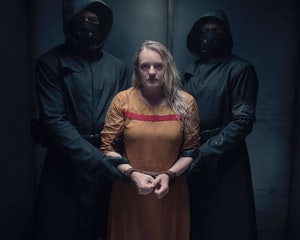 Hulu
Hulu
Handmaid's Tale Premiere Recap: June's Failure Leads to Shocking Loss of Life in One Moment
View StoryFreedom Running
The emotional trauma of losing their friends and sisters (through the bonds of torture and trauma) took their toll on June and Janine. Even as they stayed together through their run from Gilead and Aunt Lydia, the two women struck out at each other, venting their frustrations.
June even went so far as to face her own shame and guilt by lashing out at Janine in a truly hurtful way. Janine's egregious offense? She called out June for the fact that it was June who told the Eyes where the Handmaids were at, it was June who got them all captured, and it was thus June who got all of their friends killed.
It was June.
And she's absolutely right. It was June. No matter how much June wants to try and justify that she did it for fear they would hurt Hannah (they might), she allowed her friends to be captured, possibly tortured and ultimately led them to their death because she was not strong enough to protect them when faced with her daughter.
Was Janine right in thinking she would have handled it differently, we'll never know. But you know what isn't the right thing to say when faced with your own hypocrisy? When June pushed back that Janine would have probably done something stupid and dangerous, Janine pointed out what they were doing right in that moment was stupid and dangerous. Again, she was right.
June had decided they should jump on a transport train taking supplies to the front in hope of finding Mayday. Then she abruptly decided they should hide out in a tanker car, having no idea it was full of milk. How to get out without getting caught? There was no plan.
But when faced with her own inadequacies and weakness, June got in Janine's face and said, "I should've left you a long time ago."
 ABC
ABC
Meghan McCain Worried She'd Be Fired from The View 'for Being Pregnant'
View StoryIt's an almost inexcusable ugliness, one June surely did not mean. But rather than face her own failings presented to her so directly, she attacked. This is what happens when all that fear and adrenaline has nowhere to go, in that milky calm before the next storm.
That storm came soon enough, when the train was attacked by marauders. June and Janine surrendered themselves to their leader, Steven, who wasn't nearly as interested in their abilities as saboteurs, or revolutionaries, or survivalists.
After agreeing to feed and clothe them, he got right to it. "Which one of you is staying with me?" he asked. Even out from under the heel of Gilead, women cannot seem to escape this view of them as one thing, in this case, sexual gratification.
When June pushed back that she had meant they could help in other ways, Steven made it clear, "It's what you got." This is still a man's world. Strip away the trappings of civilization and society and is this what we always reduce ourselves to? Men subjugating women as objects to service them in one way or another?
Steven was even benevolent in his role, telling June that she didn't have to do anything she didn't want to do. She just couldn't stay if she didn't pleasure him sexually. See, he's a different kind of monster, one who makes it a choice. Never mind that Janine was nearly passing out from hunger and they were both desperate. "It's what you got."
And yet, the way it was presented, the instinct is there to think, oh see, he's not so bad. Not nearly as bad as Gilead. At least he's not forcing anything on them. But that's the rub. It is just as bad, just as sadistic and controlling and manipulative.
Even more tragically, when June could not bring herself to be debased again no matter the ultimate cost and was ready to leave, Janine convinced her to change out of their Handmaid's clothing first. While June was changing -- for the last time? -- in a meaningful scene, Janine did what she apparently had to do so they could stay.
Looking at all of the other women in the group brings a sickening bile up, as it's pretty clear by inference what it means for the relationships between these women and the men around them, or at least the man in charge. More than likely, there's some system for the other men.
Just like Gilead, this system was established to keep men on top, and to have women exist more as property. Just like Gilead and the pre-Gilead world from Janine's flashback, women are valued only for "what you got" than their intelligence, skills or anything else.
 TikTok
TikTok
TikToker Confronts 'Creepy' Man Taking Sneaky Pictures of Her at Airport
View StoryFreedom Standing Still
Running parallel to Janine and June's powerful run for freedom, only to find it sharing a gentler -- but no less bullshit -- variation of Gilead's atrocities upon women, Rita's story was one of what can happen when a woman is allowed to own her value, her worth and her life.
Serena tried to rope her old Martha in with a sonogram of her new baby boy, only for Rita to later find out Serena was also hoping that Rita would help her in her case against Fred. Once again, Serena was hoping to use her, control her and dictate her story.
It's notable that Rita found herself referring to Serena as "ma'am" and Fred as "sir," when she saw him later. She even referred to him as "Commander" when talking with Serena, and slipped easily back into that pseudo-religious Gilead speak. A woman of faith, Rita was struggling to unentangle her own belief system with the one Gilead built on the back of religion.
In the opening scene of the episode, Rita is seen kneading dough and making a delicious homemade meal for her and Moira. She is falling into those habits from Gilead, because she'd so internalized them.
The woman who went to Fred after she found out what Serena wanted to do was a far cry from the submissive woman who prayed with Serena, tears in her eyes, after her former mistress told her about the pregnancy.
She reiterated to Mark when he brought the legal papers for Serena's ploy that she had been considered property in Gilead, with paperwork and everything. It was a message as much for herself to hear as it was for him. After all, he already knew it and she probably knew that.
 YouTube
YouTube
Two Asian Women Fight Off Concrete Block Attacker in Baltimore Liquor Store While Customer Casually Walks Out
View StoryWhen she met with Fred, she emphasized her freedom, made it clear that they had never been friends. It was a wholly different woman meeting with him than who Serena saw. This was a woman who saw she was still being used by others for their gain and she was done.
In a world where she is allowed to make her own decisions, she decided to step out of the Waterford's lives and let them fight their own battles. She did, though, beautifully make that battle more complicated by making Fred aware of Serena's pregnancy. At this point, we don't know for sure the baby is his (he's supposed to be infertile), but there are no stronger candidates just yet.
By the closing scene of Rita's story, we see her enjoying a takeout meal of Japanese sushi. The significance of this is that she is embracing her autonomy, she is no longer prepare food for others, or even preparing food at all. She can cook if she wants to, but should feel no obligation to do so. She's free to live her life however she wants.
We told you they were painting Canada as a paradise, and yet this is the illusion of ultimate freedom that women in our real world live under all the time. Until, that is, they're pregnant, or they want to have control over their own reproductive rights, or be treated as equal to men rather than seen as nothing more than "what you got."
 Getty
Getty
Britney Spears Trashes 'Hypocritical' Documentaries for Highlighting 'Traumatizing Times' in Her Life
View StoryMore Than Story
This was a quiet episode, light on plot with just a few elements moving the overall story forward. Janine and June have landed someplace new with a new group of people. Fred knows Serena is pregnant. That's about all that happened.
From the beginning, "The Handmaid's Tale" has been about more than its plot and story. As compelling as they are, this story is uncomfortable on purpose, forcing us on purpose to look at our own relationship with the women in our society, our treatment of women, our understanding of women, our respect of women.
This is a cautionary tale about a possible future, and we are constantly being reminded that we may be closer to something very much like this than we might wish to believe. The "Me Too" movement reminds us that there have been Stevens in powerful positions living among us already for years. Many of them are still here.
Gilead is awful because of the atrocities it subjects women to in such a public way. It doesn't value them at all beyond their reproductive abilities. Look at a lot of anti-abortion messaging, and there's virtually no difference at all.
Maybe the message isn't that we're not that far removed from the horrors of Gilead. Maybe the message is that in some ways those horrors are already here. We're just doing a better job of hiding them.
New episodes of "The Handmaid's Tale" drop every Wednesday on Hulu.

